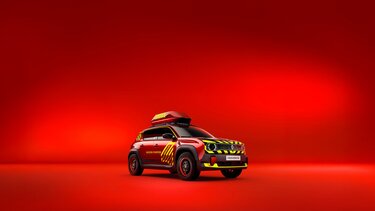Concept car designs that will shape the future of driving
10/11/2025
Concept cars have always been a window into the future. From creations that never make it to production to design studies that quietly influence the models we see on the road today; these experimental vehicles play a vital role in the automotive industry. They’re not just about turning heads at motor shows or going viral online, concept cars give us a glimpse of the technologies, ideas and philosophies that will define the cars of the future.
While some manufacturers showcase concepts that are purely flights of fancy, others – Renault included – use concept cars to chart a realistic course towards the future of electric cars. Far from being irrelevant showpieces, these projects often test innovations in electrification, digitalisation and design that filter down into production models you and I can buy.
If you want to see how a brand envisions the next decade of driving, concept cars are where to look. And Renault, with its bold, accessible vision of mobility, has been leading the charge with a portfolio of fascinating creations. You can explore Renault’s full range of incredible concept cars here.
Why concept cars matter
The significance of concept cars goes beyond design theatrics. They allow engineers to experiment with new materials, designers to explore bolder forms, and technologists to showcase innovations years ahead of regulatory approval – and get key feedback on these new ideas from the people that matter most: customers.
Think of concept cars as the car industry’s research and development laboratory, but in physical form. Many of today’s key innovations – regenerative braking, driver-assistance technology, or fully digital dashboards – were first shown to the public on concept cars.
Renault has consistently focused on a more human-centred approach – cars designed to make electrification and advanced technology accessible, exciting, and purposeful.
Renault’s reimagined icons: R4 Savane and R4 Concept Prototype

Take the Renault 4 E-Tech electric, one of the brand’s most iconic new models. First launched in the 1960s, the original R4 was a people’s car: practical, versatile, and affordable. It makes perfect sense that Renault has chosen this car as inspiration for a next-generation reinterpretation.
The Renault 4 Savane concept paid homage to the heritage of the classic, but with an adventurous, future-focused twist. Imagine a compact SUV infused with charm and nostalgia but underpinned by the latest electric technology. Its design mixes rugged practicality with modern electric performance, signalling Renault’s intent to merge its history with tomorrow’s needs.
Then there’s the Renault 4 Concept Prototype. This study takes the spirit of the R4 even further, hinting at how Renault could transform a much-loved model into a fully-fledged electric car of the future. It’s not about simply replicating the past – it’s about learning from what worked and reimagining it for an electrified age.
Both Renault 4 concept cars played a vital role in the lead up to the launch of the production version of the Renault 4 E-Tech electric, which is now wowing the press and consumers alike in Renault showrooms.
Similarly, the freshly revealed Renault Twingo E-Tech electric was initially reimagined with the Twingo Prototype concept car.
This highlights a simple message: concept cars aren’t indulgences. They’re stepping stones towards new models that honour history while embracing the future of electric cars.
Vision 4RESCUE: innovation with purpose

Vision 4RESCUE: innovation with purpose
Concept cars aren’t always about glamour. They can also embody social responsibility, showing how the cars of the future could help people in challenging situations. Renault’s Vision 4RESCUE is a prime example.
Designed with emergency services in mind, the Vision 4RESCUE highlights how electric mobility can be applied in life-saving scenarios. Its elevated stance, advanced lighting, and modular cabin show how a vehicle can be optimised for rescue operations, while its all-electric drivetrain reflects a commitment to combining performance with responsibility.
Few manufacturers explore concepts in this way, but Renault’s approach demonstrates that the future of mobility isn’t just about style and speed – it’s about designing vehicles that can meet a variety of human needs.
Cars of the future: what to expect
So, what do these concept cars tell us about the future of driving? Several trends are emerging:
- Electrification is central. Almost all modern concepts are built on electric platforms. This allows designers to rethink proportions, interiors, and functionality – moving beyond the limitations of traditional engines.
- Technology takes centre stage. Concepts increasingly feature intelligent driver assistance, augmented reality head-up displays, and AI-driven efficiency tools.
- Design language evolves. Expect sharper, more aerodynamic silhouettes, but also cabins that prioritise comfort, modularity, and connected services.
- Purpose matters. Whether it’s Renault’s Vision 4RESCUE or other brands’ experimental interiors, concept cars are more frequently designed around use cases, not just aesthetics.
- Production influence. While some wild designs may never see showrooms, many concept features – from lighting signatures to infotainment innovations – quickly become mainstream.
In short, concept cars show us that the cars of the future won’t just be electric – they’ll be smarter, more versatile, and more closely attuned to the lives of the people who use them.
Renault versus the competition
Look across the market and you’ll find plenty of headline-grabbing concepts. Nissan has showcased bold SUVs. Peugeot has leaned into futuristic cabins. Mercedes continues to dazzle with luxury visions.
Its concepts aren’t only about pushing design boundaries – they’re about building a bridge from today to tomorrow. The R4 concepts resonate with nostalgia, while the Vision 4RESCUE highlights practicality and social value. This balance of emotion, history and forward-thinking technology is what sets Renault apart.
A glimpse into tomorrow
Concept cars are the best crystal ball the car industry can offer. They might look futuristic, but they are grounded in real design, engineering and cultural thinking. They give us hints at how the future of electric cars will unfold – from the streets of cities to remote rescue operations.
Renault’s vision is particularly compelling. The brand’s concept car range shows a commitment not just to electrification, but to making the cars of the future desirable, practical, and purposeful.
Whether you’re captivated by the reinterpretation of icons like the R4 Savane, intrigued by prototypes such as the R4 Concept, or impressed by the humanitarian focus of the Vision 4RESCUE, Renault is offering a roadmap to tomorrow – and it looks both exciting and reassuringly real.
Driving the future today
The future of mobility isn’t some far-off dream – it’s being sketched, engineered and tested right now. Concept cars are more than just design exercises; they’re the foundation of the cars we’ll be driving in the years to come.
For Renault, concept cars are a way to honour the past, embrace electrification, and explore entirely new possibilities – from iconic city cars reborn as EVs, to life-saving vehicles for the emergency services. They are proof that the cars of the future can be both innovative and meaningful.
If you want to know what’s coming next – what shapes, technologies and ideas will redefine the way we drive – take a closer look at Renault’s visionary concept car portfolio. The road ahead has never looked more inspiring.
Cars shown are concept vehicles. The design, specifications, features, name, and branding are indicative only and may differ from a final production of the vehicles. Not available for purchase in the UK.
About the author
Steve is a leading UK automotive journalist, EV editor at The Independent, editor of Auto Express, Autocar and What Car?, and a global car awards judge and broadcaster.
This article is advertorial content reviewed by Renault prior to publication.
get the latest Renault news







